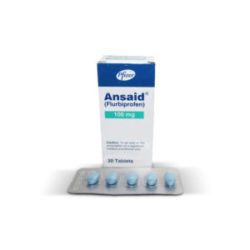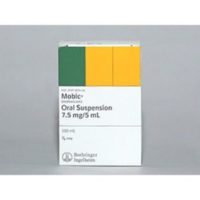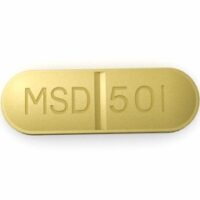Description
Drug Uses
Ansaid is indicated for treatment of rheumatoid arthritis or osteoarthritis. It may also be used for other conditions as determined by your doctor.
How Taken
Ansaid is taken by mouth followed by a full glass of water. To avoid stomach upset it is advised to take Ansaid with a meal. Consult your doctor regarding the dosage suitable for you.
Warnings/Precautions
Before taking Ansaid, tell your doctor or pharmacist if you have any medical conditions, especially if you have allergies to medicines, foods, or other substances, have a history of kidney or liver disease, diabetes, or stomach or bowel problems (e.g., bleeding, perforation, ulcers), if you have a history of swelling or fluid buildup, asthma, growths in the nose (nasal polyps), or mouth inflammation, if you have high blood pressure, a blood disorder, bleeding or clotting problems, heart problems (e.g., heart failure), or blood vessel disease, or if you are at risk for any of these diseases, if you have poor health, dehydration or low fluid volume, or low blood sodium levels, you drink alcohol, or you have a history of alcohol abuse, if you are pregnant, planning to become pregnant or are breast–feeding. Ansaid may harm the fetus. Do not use it during the last 3 months of pregnancy. If you think you may be pregnant, contact your doctor. You will need to discuss the benefits and risks of using Ansaid while you are pregnant. Ansaid passes into breast milk. Do not breast–feed while taking Ansaid. Some medicines may interact with Ansaid. Therefore tell your doctor of all prescription or nonprescription medicine, herbal preparation, or dietary supplement that you are taking. Do not take Ansaid if you have had a severe allergic reaction (e.g., severe rash, hives, trouble breathing, growths in the nose, dizziness) to aspirin or an NSAID (e.g., ibuprofen, celecoxib), if you recently had or will be having bypass heart surgery. Serious stomach ulcers or bleeding can occur with the use of Ansaid. Taking it in high doses or for a long time, smoking, or drinking alcohol increases the risk of these side effects. Contact your doctor or emergency room at once if you develop severe stomach or back pain, black, tarry stools, vomit that looks like blood or coffee grounds, or unusual weight gain or swelling. Ansaid is an NSAID. Before you start taking any new medicine, read the ingredients. If it also has an NSAID (e.g., ibuprofen) in it, check with your doctor. If you are not sure, check with your doctor or pharmacist. Lab tests, including kidney function, complete blood cell counts, and blood pressure, may be done to monitor your progress or to check for side effects. Be sure to keep all doctor and lab appointments. Elderly patients may be more sensitive to this medication. These patients might require a lower dosage or/ and special monitoring during treatment. Ansaid should be used with extreme caution in CHILDREN, safety and effectiveness in children have not been confirmed.
Missed Dose
If you miss a dose take it as soon as you remember. However if it is almost time for the next dose, skip the Missed Dose and continue your regular dosing schedule. Do not take a double dose to make up for a missed one.
Possible Side Effects
Some of the Possible Side Effects are– constipation, diarrhea, dizziness, drowsiness, gas, headache, heartburn, nausea, stomach upset, stuffy nose. Contact your doctor if any of these or other side effects occur. If you experience any of the following serious side effects, you should seek medical attention immediately– allergic reactions (rash, hives, itching, trouble breathing, tightness in the chest, swelling of the mouth, face, lips, or tongue), bloody or black, tarry stools, change in the amount of urine produced, chest pain, confusion, dark urine, depression, fainting, fast or irregular heartbeat, fever, chills, or persistent sore throat, mental or mood changes, numbness of an arm or leg, one–sided weakness, red, swollen, blistered, or peeling skin, ringing in the ears, seizures, severe headache or dizziness, severe or persistent stomach pain or nausea, severe vomiting, shortness of breath, sudden or unexplained weight gain, swelling of hands, legs, or feet, unusual bruising or bleeding, unusual joint or muscle pain, unusual tiredness or weakness, vision or speech changes, vomit that looks like coffee grounds, yellowing of the skin or eyes.
Storage
Store this medication at room temperature, between 68 – 77 °F (20 – 25 °C). Store away from heat, moisture, and light. Do not store in the bathroom. Keep Ansaid out of the reach of children and away from pets.
Overdose
If overdose is suspected seek medical attention immediately. Some of the symptoms of Ansaid overdose are– decreased urination, loss of consciousness, seizures, severe dizziness or drowsiness, severe nausea or stomach pain, slow or troubled breathing, unusual bleeding or bruising, vomit that looks like coffee grounds.
More Information
Ansaid may cause drowsiness, dizziness, blurred vision, or lightheadedness. These effects may worsen if Ansaid is taken with alcohol or certain medicines. Use Ansaid with caution. Do not drive or perform other possibly unsafe tasks until you know how you react to this drug. Do not share this medicine with others for whom it was not prescribed. Do not use this medicine for other health conditions. If your symptoms do not improve or if they worsen, contact your doctor.
Disclaimer
This is only general information, it does not cover all directions, drug integrations or precautions. You should not rely on it for any purpose, it does not contain any specific instructions for a particular patient. We disclaim all responsibility for the accuracy and reliability of this information. We`re not responsible for any damage.




Reviews
There are no reviews yet.